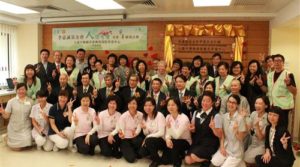(Hong Kong, 15 November 2012) The tenth Hospice Centre established under the “Heart of Gold” Hong Kong Hospice Service Programme, a collaboration programme between the Hospital Authority (HA) and the Li Ka Shing Foundation (LKSF), was opened in Hong Kong Buddhist Hospital today (15 November). The Centre provides integrated care to terminal cancer patients and their family in the Kowloon Central Cluster of HA.
The Opening Ceremony today was officiated by Mr Michael Kan Yuet Leong, Director of Li Ka Shing Foundation; Dr Cheung Wai Lun, HA Director of Cluster Services; Dr Hung Chi Tim, Cluster Chief Executive of Kowloon Central Cluster; Mr Keith Lam Hon Keung, Chairman of Hospital Governance Committee of Hong Kong Buddhist Hospital; and Dr Cheuk Tsan, Hospital Chief Executive of Hong Kong Buddhist Hospital.
Dr Cheung Wai Lun said in the ceremony, “With the establishment of the Hospice Centre, provision of services to patients and their family members such as physical, social, psychological and spiritual care, would be enhanced. Terminally ill patients would have their final journey of life as comfortable and dignified as possible. He thanked for the long-term support from the Foundation towards the palliative care service in Hong Kong.”
The initiatives in Hong Kong Buddhist Hospital under this project included the replacement of electrical operated patient beds in the palliative ward, enhanced home care service to achieve around 11,000 visits in three years from October 2010, the establishment of the Resources Centre and the Bereavement Room.
The Hong Kong Buddhist Hospital provides comprehensive and holistic healthcare services for terminal cancer patients and their families through its Palliative Care Service and the Hospice Centre, including :
– In-patient Service – There are 65 beds inside a peaceful environment for terminally-ill patients to relieve their symptoms and to soothe their discomfort, and also to address their physical, psychological and spiritual needs in their last leg of life and help make their final journey as comfortable and dignified as possible.
The Bereavement Room is opened to patients with all religious backgrounds. Patients could be accompanied by their beloved relatives and friends inside the room during their final moments. Buddhist patients may have their relatives and friends to pray for them in Buddhist practice.
– Home Visit – Nurses provide nursing care to terminal cancer patients and trainings to the caregivers of patients for their empowerment through home visits. They would immediately refer needy patients to attend medical consultation or admission to hospital during their home visits.
– Out-patient Service – Regular medical consultations and follow-ups on medication and procedures would be scheduled.
– Resources Centre – The Resources Centre provides a platform for training and for caregivers, palliative care service workers and volunteers to share their experience and.
– Volunteer Service – A team of volunteers dedicates themselves to caring for the patients and their family members. Besides organising regular activities, the volunteers also tailor-make gifts and food for the patients during major festivals.
The “Heart of Gold” Hong Kong Hospice Service Programme was launched in 2007 as a collaboration between the Hospital Authority and the Foundation. The Foundation has donated HK$82 millions to sponsor 10 public hospitals to set up hospice centres with matching funds from the Hospital Authority. More than 100 healthcare professionals provide holistic services to terminal cancer patients. Services include bereavement counseling, home visit and organising training for volunteers to enhance volunteer service in hospice care. To date, the “Heart of Gold” Hong Kong Hospice Service Programme:
•Served more than 18,000 primary cancer patients
•Provided more than 38,000 home care visits
•Provided more than 30,000 sessions of psychological counseling for patients and their family members
•Provided bereavement counseling to more than 1,400 children

